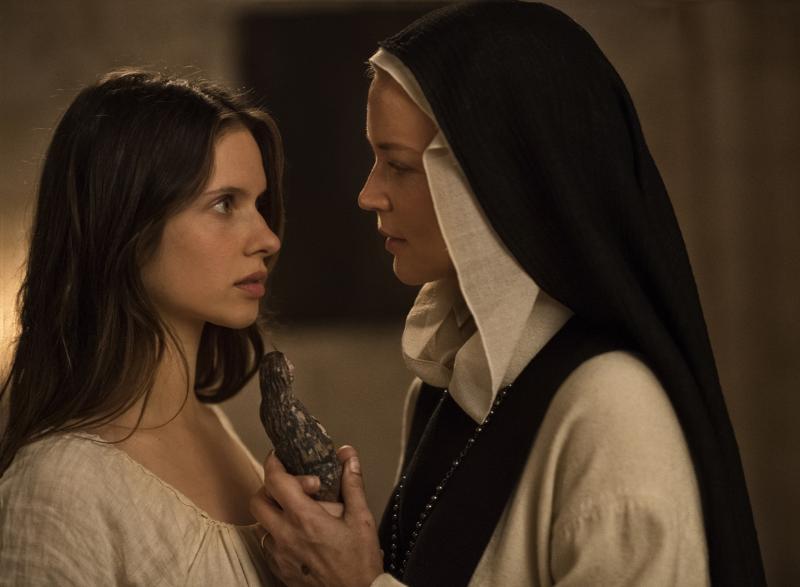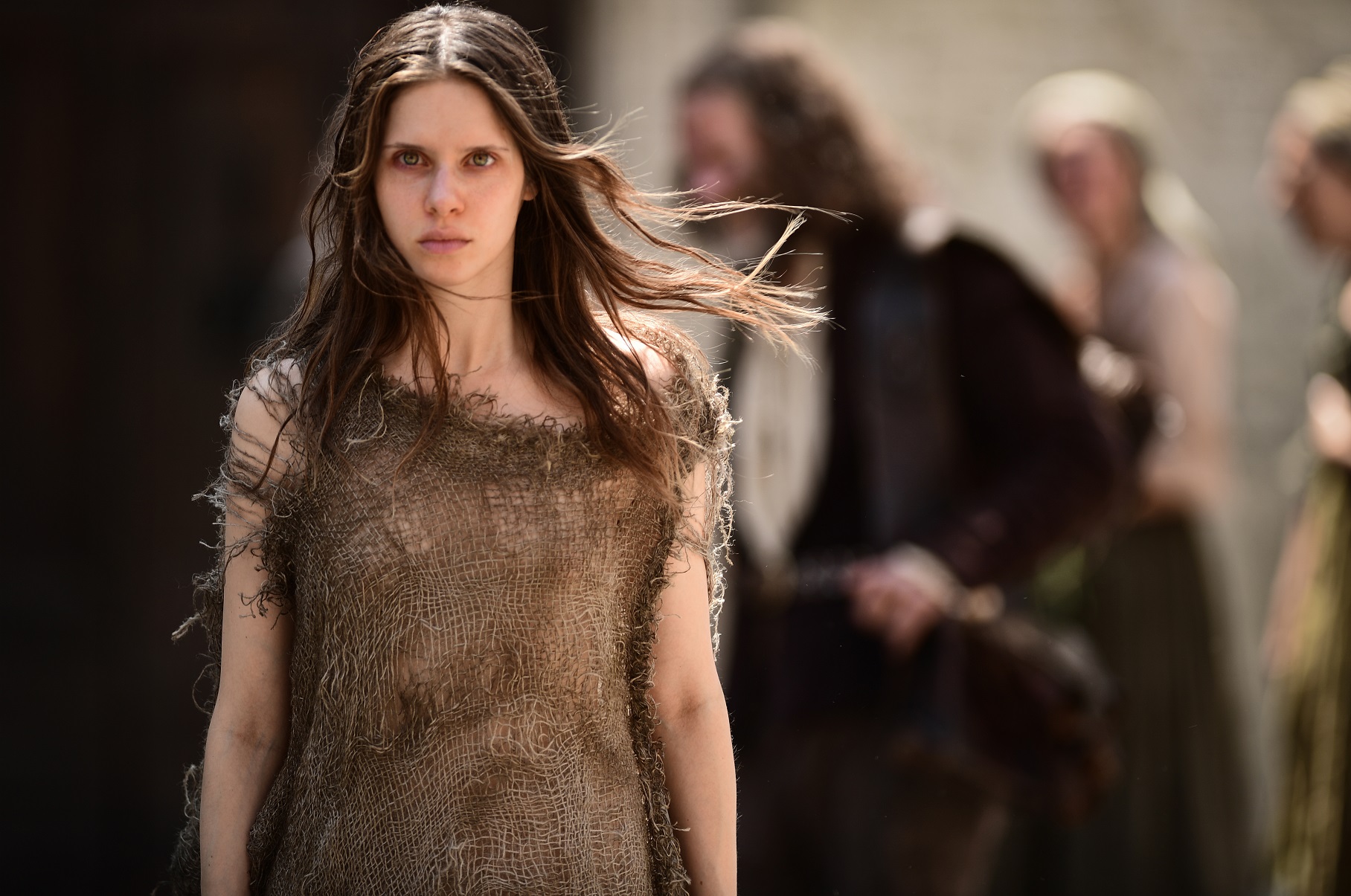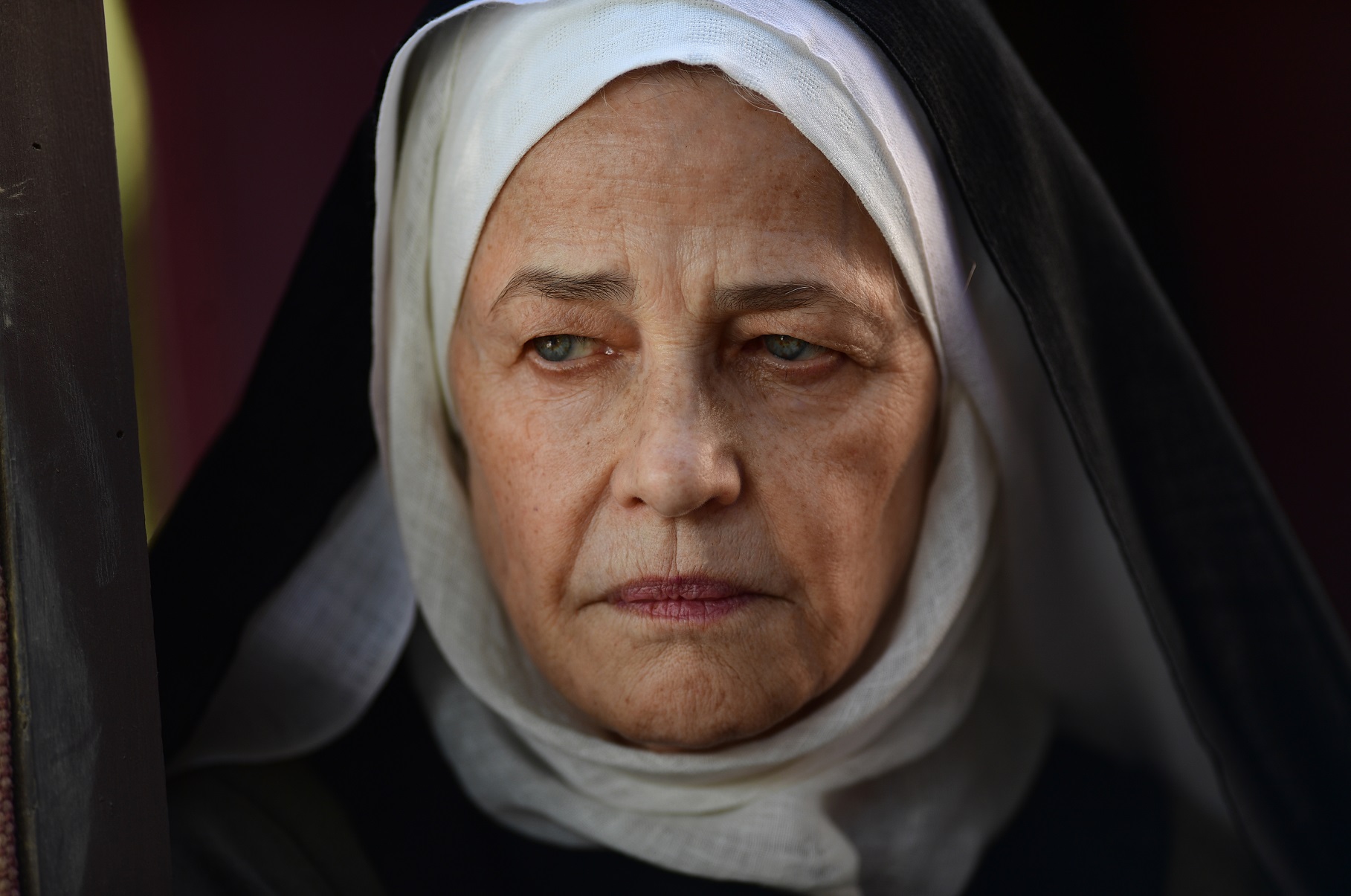Benedetta review - lesbian nuns' sex and faith collide | reviews, news & interviews
Benedetta review - lesbian nuns' sex and faith collide
Benedetta review - lesbian nuns' sex and faith collide
Paul Verhoeven's quaintly provocative, vivid account of Renaissance convent lust

Paul Verhoeven’s latest provocation is an old-fashioned but vigorous 17th century lesbian nun shocker, based on eye-poppingly explicit testimonies at the Christian church’s sole lesbian trial. It’s his most sustained examination of faith and sex, a theme going back to the repressive Calvinist father and sexually anarchic teens of his wild Dutch hit, Spetters (1980).
Benedetta (Virginie Efira) has been imbued with a sense of religious destiny since childhood. Accepted into a Tuscan convent under stern but worldly Abbess Felicia (Charlotte Rampling), confusing, erotically charged dreams of Jesus are worsened when new peasant nun Bartolomea (Daphné Patakia, pictured below) makes her feelings for Benedetta friskily clear; the Virgin Mary statuette she whittles into a dildo symbolises their blasphemous entanglement. Benedetta is soon sporting perhaps self-inflicted stigmata. The Abbess and church authorities see political advantage in a local saint, till Benedetta stages a convent coup, forcing a showdown which puts her sapphic crime on trial.

Benedetta’s female nudity is very Seventies, in its lingering male gaze and its cheerfulness. Benedetta and Bartolomea’s first big sex scene is clumsy, chatty and enjoyable. It combines the liberated, natural lustiness of his early Dutch films with the hysterically performative bonking of Basic Instinct and Showgirls, the latter due to Verhoeven’s holler for louder Efira orgasms. Though he pushes the explicitness far past Sharon Stone’s notorious flash, Benedetta can feel quaint, like nunsploitation of yesteryear, gotten round to a bit too late.
This is also a film in which Benedetta dreams of her breast being slashed by a rapacious soldier, and Bartolomea is stretched nude on a rack for (unseen) vaginal torture. Verhoeven’s Hollywood debut, Flesh+Blood (1985), subjected Jennifer Jason Leigh to worse in its muddily unvarnished medieval saga, and Kevin Bacon’s character’s abuse of invisibility to rape was the most Verhoeven touch in his US swansong, Hollow Man (2000). Sympathy for his violated but indomitable women still rises above mere misogynist exploitation.

Efira gives Benedetta a nervy, protean potency, possessed by the word of God when cornered, and sparring with male authorities even when tethered to a smouldering stake. She’s no easily persecuted witch, but a self-anointed saint, fighting back with her personal Jesus by her side.
Verhoeven’s book Christ: The Man is interested in him as a rebel philosopher, not miracle-worker, and this is a film which respects Bernadette’s faith but thinks it unfounded, contemplating serious ideas, but unable to reach for the supernal. Verhoeven is having fun, dutifully fulfilling the lurid expectations of a lesbian nun flick with his name on it. For a film with a Virgin Mary dildo released on Good Friday, though, he doesn’t go far enough.
The future of Arts Journalism
You can stop theartsdesk.com closing!
We urgently need financing to survive. Our fundraising drive has thus far raised £49,000 but we need to reach £100,000 or we will be forced to close. Please contribute here: https://gofund.me/c3f6033d
And if you can forward this information to anyone who might assist, we’d be grateful.

Subscribe to theartsdesk.com
Thank you for continuing to read our work on theartsdesk.com. For unlimited access to every article in its entirety, including our archive of more than 15,000 pieces, we're asking for £5 per month or £40 per year. We feel it's a very good deal, and hope you do too.
To take a subscription now simply click here.
And if you're looking for that extra gift for a friend or family member, why not treat them to a theartsdesk.com gift subscription?
more Film
 theartsdesk Q&A: director Kelly Reichardt on 'The Mastermind' and reliving the 1970s
The independent filmmaker discusses her intimate heist movie
theartsdesk Q&A: director Kelly Reichardt on 'The Mastermind' and reliving the 1970s
The independent filmmaker discusses her intimate heist movie
 Blu-ray: Wendy and Lucy
Down-and-out in rural Oregon: Kelly Reichardt's third feature packs a huge punch
Blu-ray: Wendy and Lucy
Down-and-out in rural Oregon: Kelly Reichardt's third feature packs a huge punch
 The Mastermind review - another slim but nourishing slice of Americana from Kelly Reichardt
Josh O'Connor is perfect casting as a cocky middle-class American adrift in the 1970s
The Mastermind review - another slim but nourishing slice of Americana from Kelly Reichardt
Josh O'Connor is perfect casting as a cocky middle-class American adrift in the 1970s
 Springsteen: Deliver Me From Nowhere review - the story of the Boss who isn't boss of his own head
A brooding trip on the Bruce Springsteen highway of hard knocks
Springsteen: Deliver Me From Nowhere review - the story of the Boss who isn't boss of his own head
A brooding trip on the Bruce Springsteen highway of hard knocks
 The Perfect Neighbor, Netflix review - Florida found-footage documentary is a harrowing watch
Sundance winner chronicles a death that should have been prevented
The Perfect Neighbor, Netflix review - Florida found-footage documentary is a harrowing watch
Sundance winner chronicles a death that should have been prevented
 Blu-ray: Le Quai des Brumes
Love twinkles in the gloom of Marcel Carné’s fogbound French poetic realist classic
Blu-ray: Le Quai des Brumes
Love twinkles in the gloom of Marcel Carné’s fogbound French poetic realist classic
 Frankenstein review - the Prometheus of the charnel house
Guillermo del Toro is fitfully inspired, but often lost in long-held ambitions
Frankenstein review - the Prometheus of the charnel house
Guillermo del Toro is fitfully inspired, but often lost in long-held ambitions
 London Film Festival 2025 - a Korean masterclass in black comedy and a Camus classic effectively realised
New films from Park Chan-wook, Gianfranco Rosi, François Ozon, Ildikó Enyedi and more
London Film Festival 2025 - a Korean masterclass in black comedy and a Camus classic effectively realised
New films from Park Chan-wook, Gianfranco Rosi, François Ozon, Ildikó Enyedi and more
 After the Hunt review - muddled #MeToo provocation
Julia Roberts excels despite misfiring drama
After the Hunt review - muddled #MeToo provocation
Julia Roberts excels despite misfiring drama
 London Film Festival 2025 - Bradley Cooper channels John Bishop, the Boss goes to Nebraska, and a French pandemic
... not to mention Kristen Stewart's directing debut and a punchy prison drama
London Film Festival 2025 - Bradley Cooper channels John Bishop, the Boss goes to Nebraska, and a French pandemic
... not to mention Kristen Stewart's directing debut and a punchy prison drama
 Ballad of a Small Player review - Colin Farrell's all in as a gambler down on his luck
Conclave director Edward Berger swaps the Vatican for Asia's sin city
Ballad of a Small Player review - Colin Farrell's all in as a gambler down on his luck
Conclave director Edward Berger swaps the Vatican for Asia's sin city
 London Film Festival 2025 - from paranoia in Brazil and Iran, to light relief in New York and Tuscany
'Jay Kelly' disappoints, 'It Was Just an Accident' doesn't
London Film Festival 2025 - from paranoia in Brazil and Iran, to light relief in New York and Tuscany
'Jay Kelly' disappoints, 'It Was Just an Accident' doesn't

Add comment